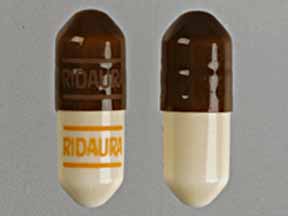Ridaura Interactions
There are 149 drugs known to interact with Ridaura (auranofin), along with 9 disease interactions, and 1 alcohol/food interaction. Of the total drug interactions, 22 are major, 126 are moderate, and 1 is minor.
- View all 149 medications that may interact with Ridaura
- View Ridaura alcohol/food interactions (1)
- View Ridaura disease interactions (9)
Most frequently checked interactions
View interaction reports for Ridaura (auranofin) and the medicines listed below.
- albuterol
- Beano (alpha-d-galactosidase)
- benzonatate
- clopidogrel
- Cymbalta (duloxetine)
- Eliquis (apixaban)
- finasteride
- Fioricet (acetaminophen / butalbital / caffeine)
- fluticasone nasal
- gabapentin
- hydroxyzine
- indomethacin
- Levoxyl (levothyroxine)
- Lyrica (pregabalin)
- Medrol (methylprednisolone)
- melatonin
- meprobamate
- metformin
- Metoprolol Tartrate (metoprolol)
- Mobic (meloxicam)
- multivitamin
- Nexium (esomeprazole)
- nortriptyline
- Plaquenil (hydroxychloroquine)
- prednisone
- Prilosec (omeprazole)
- Seroquel (quetiapine)
- simvastatin
- tizanidine
- Vitamin D3 (cholecalciferol)
Ridaura alcohol/food interactions
There is 1 alcohol/food interaction with Ridaura (auranofin).
Ridaura disease interactions
There are 9 disease interactions with Ridaura (auranofin) which include:
- bone marrow aplasia
- gold induced disorders
- congestive heart failure
- diabetes mellitus
- liver disease
- rash
- renal dysfunction
- severe hypertension
- systemic lupus erythematosus
More about Ridaura (auranofin)
- Ridaura consumer information
- Compare alternatives
- Pricing & coupons
- Reviews (2)
- Drug images
- Side effects
- Dosage information
- During pregnancy
- Drug class: antirheumatics
- Breastfeeding
- En español
Related treatment guides
Drug Interaction Classification
| Highly clinically significant. Avoid combinations; the risk of the interaction outweighs the benefit. | |
| Moderately clinically significant. Usually avoid combinations; use it only under special circumstances. | |
| Minimally clinically significant. Minimize risk; assess risk and consider an alternative drug, take steps to circumvent the interaction risk and/or institute a monitoring plan. | |
| No interaction information available. |
See also:
Further information
Always consult your healthcare provider to ensure the information displayed on this page applies to your personal circumstances.


